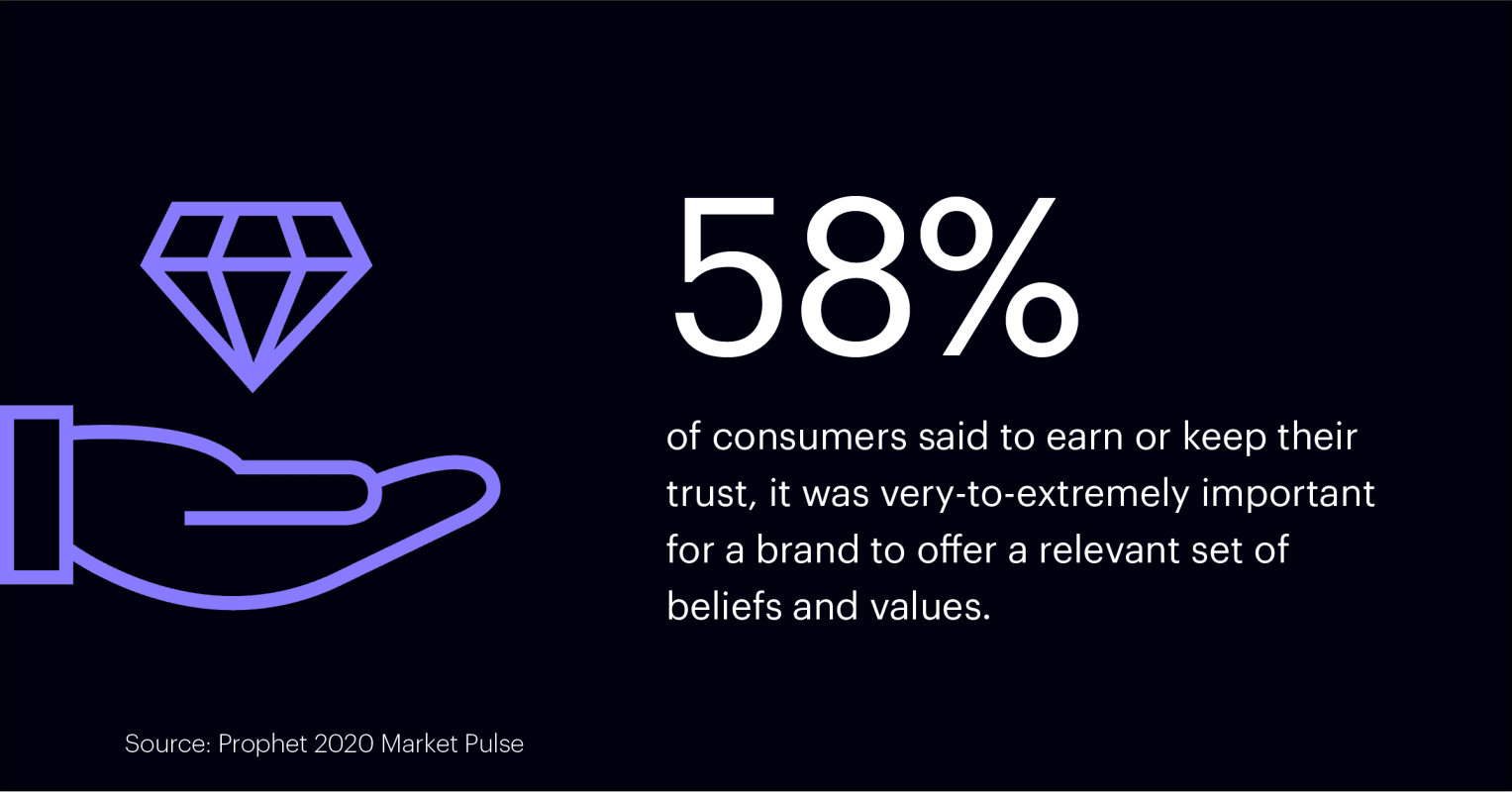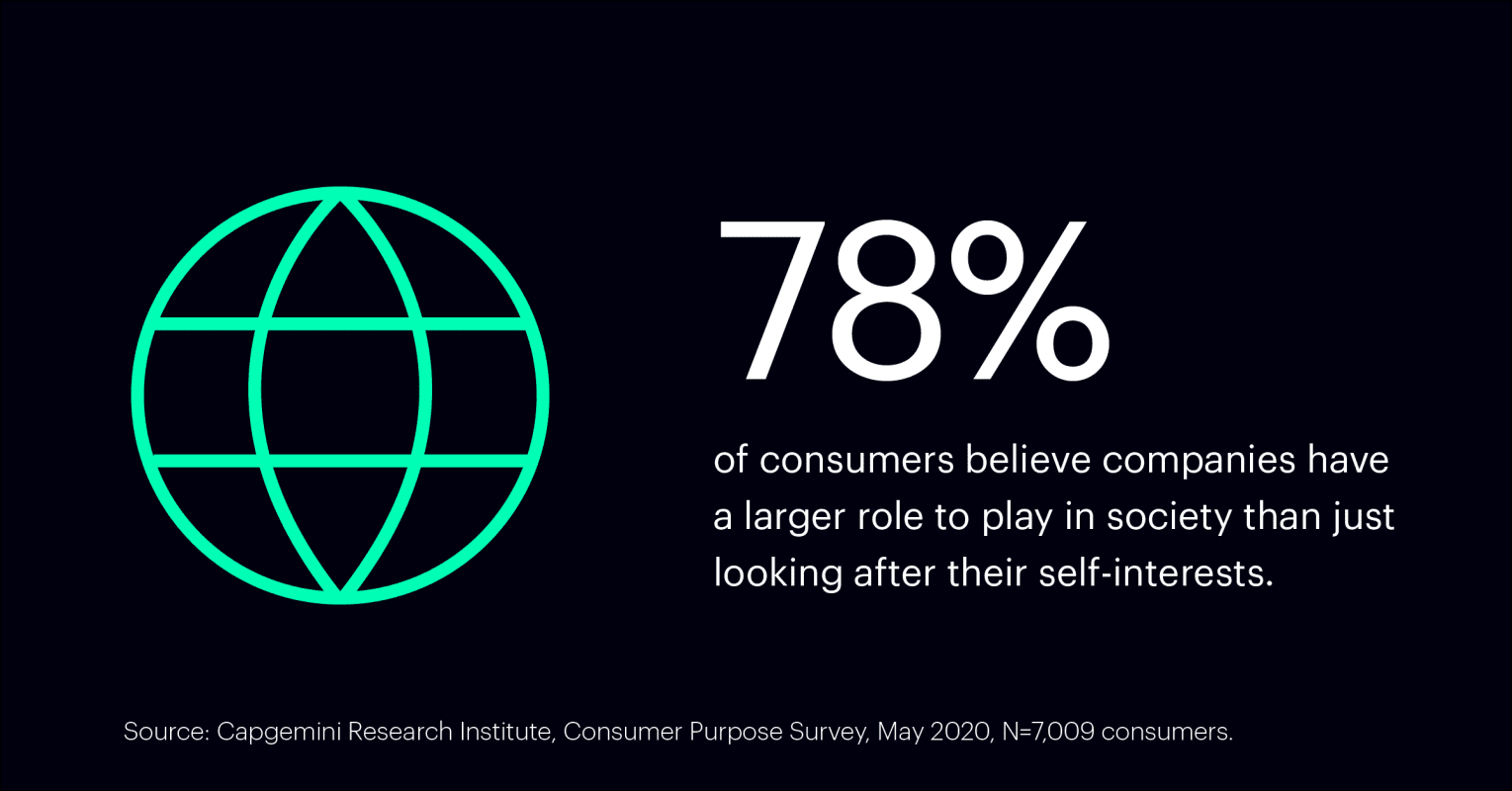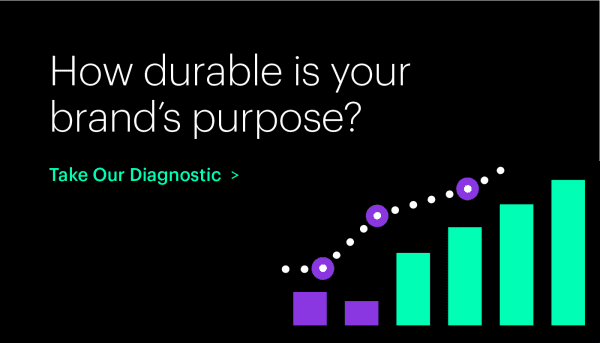BLOG
Why Purpose-Led Brands are Winning with Consumers
There’s a new contract, and people expect companies they buy from to protect employees, society and the planet.
For years, companies told consumers what their brand stood for, shouting it from four-story billboards. Whether the company lived up to that purpose didn’t really matter – there wasn’t an easy way for consumers to see behind closed doors nor engage in dialogue. Then, technology transformed consumer expectations. Consumers demanded two-way interactions, constant sharing and ubiquitous connectivity. They were no longer willing to be talked at but rather wanted to be talked to. So, brands built long-term strategies around the voice of the consumer – ensuring their purpose and what they put into the market reflected what target consumers had told them. For a while, that was enough. But now, we are at another inflection point.
“Brands today must not only be vocal in tough conversations but also take action to push the causes they support forward.”
As the world, and more specifically, the United States grapples with the causes and effects of COVID-19, the #MeToo movement, Black Lives Matter, political unrest, climate change, the wealth gap, and more, brands are now being asked to take a stance. Brands today must not only be vocal in tough conversations but also take action to push the causes they support forward.
Human Values are at the Core of Purpose-Led Brands
The Business Roundtable, a non-profit association of CEOs from major U.S. companies, recently asserted that “each of our stakeholders is essential” – including customers, employees, suppliers, communities, and shareholders and “we commit to deliver value for all of them.”
And yet, this idea of shared value will not be enough moving forward. Shared value implies something insular – engaging with and providing value to those already inside a brand’s bubble. At Prophet, we believe brands need, at their core, to have the shared human values that many global societies are striving toward in the twenty-first century: freedom, equality, solidarity, tolerance, respect for nature, and shared responsibility.
A recent Prophet survey asked business leaders about how they define trust in times of crisis. Results demonstrate that consumers are at a tipping point – it is no longer acceptable for brands to only focus on shared value. Now successful brands must demonstrate a focus on these shared human values.

When asked in April, 58 percent of consumers said to earn or keep their trust, it was very-to-extremely important for a brand to offer a relevant set of beliefs and values. By June, this number had jumped to 69 percent. Consumers are no longer willing to trust brands that have fallen out of touch with society’s progress; in fact, 78 percent of consumers believe companies have a larger role to play in society than just looking after their self-interests. Employees feel similarly; in a McKinsey survey, employees said that contributing to society should be a top priority of their companies.

While a brand purpose is critical in providing a ‘North Star’ for an organization’s strategy and culture, it is not sufficient. Companies must ensure their purpose is broad-based and bold, not myopic or near-sighted. They must then authentically and holistically act against this purpose. Today, companies struggle to complete both, equally important, tasks. McKinsey’s study demonstrated that only 21 percent of purpose statements focus on contributing to society and only 42 percent of employees at US companies believe their company’s stated “purpose” had much effect.
Those that do not boldly demonstrate action related to their purpose are penalized– 53 percent of consumers who are disappointed with a brand’s words or actions on a societal issue complain about it, 47 percent walk away from the brand in frustration, and 17 percent never come back. On the other hand, those brands that demonstrate a continued focus through action are rewarded. Unilever’s “Sustainable Living” brands are growing 50 percent faster than the company’s other brands and delivering more than 60 percent of the company’s growth.
Four Ways to Rethink Brand Purpose
We believe brands that are willing to actively demonstrate their brand purpose can push society forward by:
- Defining a human value(s) they stand behind. Brands must consider the societal context in which they exist and the human needs present in this context; they must define which of these needs they are willing to support and push forward.
- Ensuring their brand purpose is based on that human value(s). Brands must use this understanding of societal context and human values to ensure their purpose encompasses them. Rather than focusing on what they believe they should deliver, companies must focus more holistically on what society needs them to deliver.
- Continuously messaging and providing action to demonstrate commitment to their purpose. Brands must put their purpose into action, continuously speaking out and delivering relevant products, services, experiences, charitable giving, campaigns and events to market the human value they are trying to push forward.
- Maintaining focus on this purpose internally. Business leaders must demonstrate to their employees and key stakeholders that a consistent focus on brand purpose is not only rewarded but required. Building an organization and culture around the brand purpose will empower employees to hold the organization accountable to its words.

FINAL THOUGHTS
The wariness of brands to take action – whether because they fear losing profit or stickiness with target consumers – is misplaced. Brands that have a well-defined and bold purpose often attract and retain the best talent. In sum, brands that define a bold purpose and truly deliver on it don’t lose profitability, they gain it. Furthermore, brands concerned that their actions will alienate consumers forget that the shared human values their purpose was built on were those that were relevant to core, target consumers. Though brands that act on their purpose may lose business in the short-term, they bolster their relationship with their core consumers, leading to longer-term gains.
Brands that take these steps have a chance to not only win with consumers and grow faster than their competitors, but also positively influence society in a long-lasting way. Interested in learning more about how Prophet helps our clients create actionable purpose-led brands?
